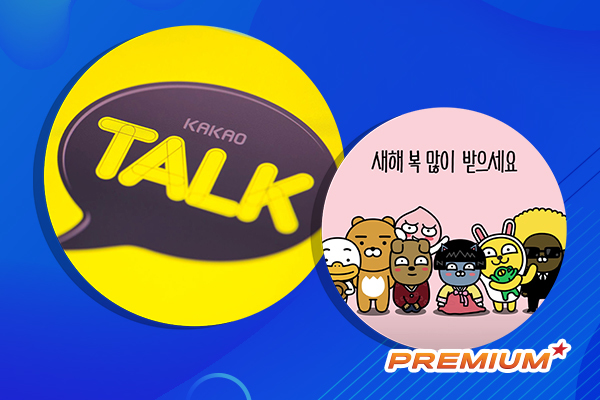Korean social network ‘beats’ Facebook
- Tram Ho
In Korea, you can do everything with Kakao: send ice cream to your friends, get updates on new games, manage your bank accounts, hail a taxi… Sounds sweet, but we’re not talking about chocolate here. here, but about a media empire of the country of “ginseng”.
“Empire” Kakao
South Korea is one of the most “digitized” countries in the world with the average Internet speed and the percentage of Internet users being among the top. About 87% of Koreans between the ages of 20 and 29 use social media. Some domestic social networks like Cyworld, although initially dominating the market, they gradually lost their footing in 2009 and were surpassed by foreign competitors such as Facebook or Twitter. However, today local networks are still extremely popular, including KakaoTalk.

Mr. Kim Beom Su founded Kakao in 2010, starting from the messaging application KakaoTalk. KakaoTalk docked in the App Store in March 2010. In less than a year, the app reached 10 million users. As of December 2020, 99.1% of Korean mobile users use KakaoTalk, an unprecedented rate for any software or social network in the world. In 2012, Kakao opened the KakaoStory social network. By 2018, 26.3% of Korean social media users started using KakaoStory regularly. Meanwhile, despite spreading across the globe, only 55.4% of Korean social media users use Facebook and 24.2% use Facebook Messenger.
Former KakaoTalk CEO Sirgoo Lee once said he views KakaoTalk as more of a social network than a messaging app. Messaging and calling are core functions on the app, but users can play games, pay online, make restaurant reservations, book hotel rooms, and give each other gifts.
The success of KakaoTalk is not a special case in Korea. The truth is that this country always has “homegrown” leaders. For example, the search engine Naver dominates the Internet search market, followed by Daum Kakao, while Google has a small market share. Korea also initiated many global trends, such as taking selfies (selca), broadcasting online (livestream) on Afreeca TV or Naver V Live. If other countries are still struggling with livestream, a survey by Nansmedia in early 2017 showed that nearly 80% of Korean Internet users had used a streaming platform in the previous 12 months.
The advantage of the pave the way
The services Kakao provides are not too innovative but still able to surpass Facebook. There are many reasons for this success, from local content (K-pop stars) to Android focus (73.86% of Korean Android users). In addition, KakaoTalk is a true mobile application and was born at the right time.
When KakaoTalk first appeared, the new smartphone was at an early stage of popularity in the country. Their biggest rival is Naver, aka the “Google of Korea”. KakaoTalk has the advantage of a pioneer. As a free alternative to traditional SMS, it spreads like wildfire. More and more people open KakaoTalk, it becomes more and more useful and solidifies its position in Korean society. This is a disaster for traditional carriers. In fact, several telecom carriers have sued Kakao but to no avail.
KakaoTalk also developed My People, the first application in Korea for PCs, which can synchronize messages between smartphones and computers. After KakaoTalk added a desktop version, My People was removed.
All of the above features make KakaoTalk the champion, but what helps the application maintain the throne is AniPang. AniPang is a popular game similar to Candy Crush that users play through KakaoTalk. It created a craze in the country in 2012, even spreading to other countries like the Philippines in 2014. Since KakaoTalk connects users to phone books, Kakao games automatically connect people on the boards. virtual point. Within a year of launching the game platform, KakaoTalk recorded 400 million game downloads and increased the number of app users by 30 million.
Games are an important part of messaging in the Korean market. Once again, KakaoTalk has the leading edge. Rival Facebook Messenger didn’t officially launch the Instant Games game platform until 2017 globally. The success of Anipang brings in hundreds of thousands of dollars a day in revenue for KakaoTalk, and also brings along a series of other games on the platform. In the first quarter of this year, the game contributed more than $115 million in revenue to parent company Kakao.
Kakao also gave Facebook a “smell” when it soon allowed users to express more emotional states with content from friends. KakaoStory introduced the set of emotions (like, interesting, happy, sad, fighting) a few years ago when Facebook added Reactions in 2016. When a user adds a cover photo to KakaoStory, it will automatically appear on the account. Their KakaoTalk.
Thanks to unlimited calling and messaging features, KakaoTalk can be customized to suit customers in different markets. As Bloomberg once wrote: “Seoul to Manila is only 3 hours apart by flight, but there are countless cultural differences. That’s why Kakao tailors the software to each market through recruiting local artists, creating virtual stickers that sell through the app, and through bringing local businesses onto the platform.”
According to former CEO Sirgoo Lee, “customization is the keyword”. For example, KakaoTalk’s distinctive yellow color works well in Korea, but many Indonesians prefer orange. So they can convert the color to orange and the look will be slightly different as well.
Before a powerful competitor like Facebook, KakaoTalk can still succeed by addressing the unique needs of domestic users, cultural colors, and small groups. Minister of Information and Communications Nguyen Manh Hung once shared that the characteristics of culture are inimitable, only those who are really born and raised in a land can understand the culture of that locality. Due to the cultural colors, small groups, and “big guys” of global social networks, it is very difficult to solve this problem. This is the opportunity of Vietnamese social networks. The success that KakaoTalk has achieved in the local market shows that this is not impossible.
Source : Genk
